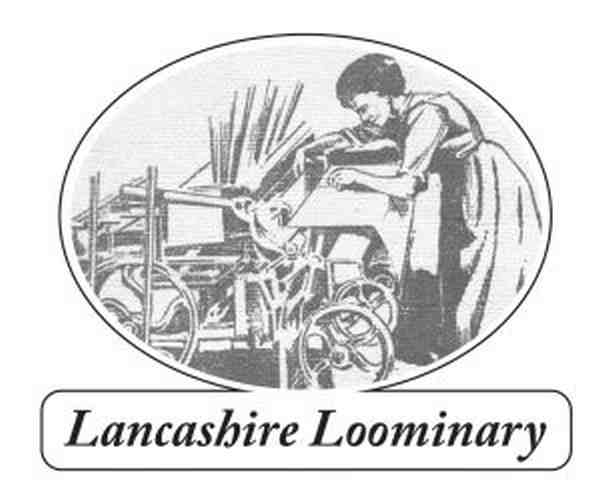The Northern Salvo
Incorporating Weekly Notices, Sectional Appendices, and Northern Weekly Salvo
Published at Station House, Kents Bank, Lancashire-North-of-the-Sands, LA11 7BB and at 109 Harpers Lane, Bolton BL1 6HU (both Lancashire)
email: paul.salveson@myphone.coop
Publications website: www.lancashireloominary.co.uk
No. 313 September/October 2023
Salveson’s half-nakedly political digest of railways, tripe and secessionist nonsense from Up North.
September sunshine…..
Cor, what a scorcher! Nice to have some late summer sunshine, with time to get out into the garden and do some trackwork. 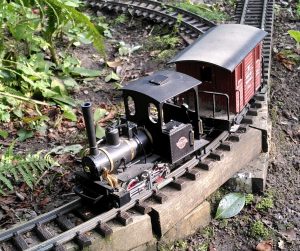 I had hoped to spend some time on the ‘Railway Library’ at Kents Bank but it’s not quite the weather to be stuck in a cellar. But good to have a choice.
I had hoped to spend some time on the ‘Railway Library’ at Kents Bank but it’s not quite the weather to be stuck in a cellar. But good to have a choice.
In this Salvo I mention my next book project, on the cultural and social impact of local branch lines – some long gone (but not forgotten) and some still thumping along. My latest book Lancastrians – Mills, Mines and 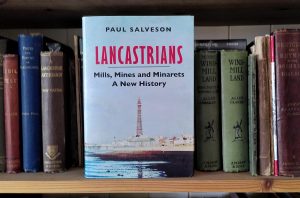 Minarets. A New History, is published by Hurst. It covers questions of identity and several themes often neglected by more conventional histories. The ‘launches’ have all gone well with more talks in the offing (see below). Salvo readers can get a 25% discount by entering LANCASTRIANS 25 at the checkout on Hurst’s website www.hurstpublishers.com
Minarets. A New History, is published by Hurst. It covers questions of identity and several themes often neglected by more conventional histories. The ‘launches’ have all gone well with more talks in the offing (see below). Salvo readers can get a 25% discount by entering LANCASTRIANS 25 at the checkout on Hurst’s website www.hurstpublishers.com
I’m sad to have to record the deaths of two outstanding people. David Mackereth, of Stretford, a very active champion of Urmston station adoption and ‘community rail’ generally, passed on recently after a fairly short illness. David was very active in a wide range of activities and he will be sadly missed. The superb displays at Urmston station are just part of his legacy. In Bolton the diminutive figure of Malcolm Pittock was a well known in a wide range of campaigns, particularly the peace movement. Though small of stature he was a very big man in every other way. His death at the age of 94 has been widely mourned. We shall not see his like again.
Very best wishes to the Rev. John McKegney, former chairman of the Railway Preservation Society of Ireland and a great example of the fine tradition of Liberal Protestantism in Ireland. He has been struggling with a serious illness for some time and his condition has recently deteriorated. Our hopes and prayers are with you John.
Booking Offices: a people’s revolt
The announcement in early July that hundreds of station booking offices were to close (mostly in England) was greeted with a storm of opposition.  The (extended) deadline for comments on this ill-thought proposal was September 1st, and an amazing 680,000 submissions have been made. I suspect most will be against. There is still time to sign the parliamentary petition which opposes the plans. At the last count there was well over the 100,000 required to trigger a parliamentary debate. But worth keeping on the pressure and if you haven’t signed yet, please do…It’s below, in the accompanying article that recently appeared in Chartist magazine (www.charist.org.uk):
The (extended) deadline for comments on this ill-thought proposal was September 1st, and an amazing 680,000 submissions have been made. I suspect most will be against. There is still time to sign the parliamentary petition which opposes the plans. At the last count there was well over the 100,000 required to trigger a parliamentary debate. But worth keeping on the pressure and if you haven’t signed yet, please do…It’s below, in the accompanying article that recently appeared in Chartist magazine (www.charist.org.uk):
Stop this Beeching of the Booking Offices
The last couple of months have seen an unparalleled explosion of passenger anger over the Government’s plans to close down hundreds of station ticket offices. It is being presented as a proposal by the train companies, who manage most station ticket offices, but there is no question that this is Government -inspired.
It has been spectacularly badly managed. The original consultation period offered just over three weeks for people to respond to what is one of the biggest changes proposed for the railways since the Beeching cuts of the 1960s. Whilst Beeching was far worse, cutting thousands of miles of track, the attitude demonstrated by the cuts has much in common. 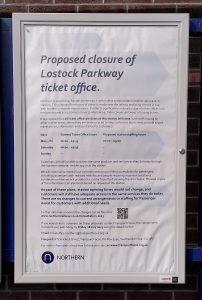 It is a sledgehammer approach with no analysis of particular stations, still less any consideration of how ticket offices could widen their scope to take in other retail activities. Groups like the Rail Reform Group have proposed re-purposing the traditional ticket office to offer a wider range of services and goods, whilst retaining ticket sales.
It is a sledgehammer approach with no analysis of particular stations, still less any consideration of how ticket offices could widen their scope to take in other retail activities. Groups like the Rail Reform Group have proposed re-purposing the traditional ticket office to offer a wider range of services and goods, whilst retaining ticket sales.
It is being foisted on train operating companies by a Government which is desperate to save money on the railways, following Covid and as well as the on-going strikes. There is an element of political spite in all of it, as a way of attacking the unions and cutting staff.
It makes no sense in terms of passenger convenience, despite the hype that we will somehow get a better service. While a lot has been said, rightly, about how elderly and disabled people will be particularly hit, it cuts across most rail users. Ticket machines can be OK if you’re making a simple journey, but you may well need help if the trip involves several changes, route options and possibly starting from a different station. Tourists from abroad using the rail network need help from a friendly face, not trying to work out a route by machine – and often paying too much.
Much has been made of the figure of ‘only’ 12% of ticket sales coming through staffed ticket offices. Yet that masks large variation across the network and we are not told what percentage of revenue is taken by the different methods. My suspicion is that ticket offices take much more than 12% of revenue, as opposed to numerical sales, because people tend to use staffed offices for longer and usually more costly journeys.
Lest anyone thinks I’m being too easy on the train companies, let’s just spell it out. This is an English, Tory Government project. There are no plans to close ticket offices where there is devolved government, including Scotland, Wales, Merseyside and Greater London where TfL control stations through their London Overground operator. In Scotland there will be the ludicrous situation of some of the busiest stations, such as Glasgow Central, having no ticket office while small local stations, run by ScotRail (owned by the Scottish Government) will keep there’s. Liverpool Lime Street, operated by Avanti, loses its ticket office but all local stations run by Merseyrail will remain open.
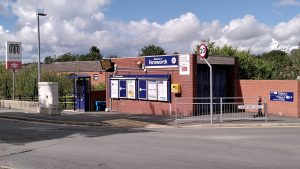
It’s surprising that none of the main parties have made much of the ticket office issue. There’s a pool of public anger out there that the opposition parties could capitalize on.
The proposals say that no station currently with a ticket office will be left unstaffed yet these are weasel words. At most locations there will be ‘flexible’ staff who provide assistance to passengers, but their hours of attendance will typically be no more than a couple of hours per day.
The unions have fought back with petitions, marches, demonstrations, posters, leaflets and social media initiatives. The consultation process was extended to September 1st as a result of public pressure, which suggests the Government is already on the back foot. There is a Parliamentary Petition that is still open and has already attracted over 100,000 signatures. It is worded ‘require train operators keep ticket offices and platform staff at train stations’. Should the petition exceed 100,000 signatures before the deadline on18th October (which it already has) it will be considered for a parliamentary debate. The weblink to sign the petition is here: https://petition.parliament.uk/petitions/636542 .
If train companies (and their Government bosses) are determined to close some of the smaller ticket offices, then offer them rent-free to  social enterprises, with suitable training and assistance in purchasing equipment (much of which could be redundant if the plans go through). This model already works at stations like Gobowen and Millom, which will not of course be closed. Irlam (left) is a great example of what can be done at a small station that was once a derelict shell.
social enterprises, with suitable training and assistance in purchasing equipment (much of which could be redundant if the plans go through). This model already works at stations like Gobowen and Millom, which will not of course be closed. Irlam (left) is a great example of what can be done at a small station that was once a derelict shell.
The ‘Beeching of the Booking Offices’ can be reversed. It is part of an attempt to ‘dehumanise’ public transport at a time when people need people for all sorts of reasons – safety and security, information, reassurance. It’s time to make a stand: To the barriers, comrades!
The Politics Bit
I wish I could feel more positive about the political scene. John Nicolson’s letter (see below, Reader’s Write) says it all. If someone who regards himself as being on the right of Labour thinks he is likely to get expelled for admitting to voting tactically, what hope is there? We currently have the unedifying spectacle of Labour and the Lib Dems squalling about who is best to win Nadine Dorries’ former seat of Mid-Bedfordshire. I suspect the answer might be the Tories given a split vote between Labour and Lib Dem. But maybe common sense will kick in and voters themselves will plump for who they see as the best option. I suspect it may be the Lib Dem, with Labour holding sway at Tamworth. It’s OK Labour saying they came second in Mid-Beds last time but the key is getting thousands of former Toru voters to switch – and that might be best done to the Lib Dems in this leafy Home Counties seat.
Meanwhle the Greens continue to suffer from our outdated voting system. Next year’s General Election will seem them squeezed between Labour and Lib Dem as voters decide which is best placed to get rid of Sunak and his awful bunch. I’d dearly love to vote Green – more than any of the existing parties they are far the closest to my views. But…I don’t live in Brighton or Norwich, nor even Bristol. So I’ll grit my teeth and vote for a party (Labour) which I have less and less faith in at national level.
The same ‘squeeze’ will happen to the small regionalist parties, like The Yorkshire Party, who are doing well at a local level. I’m currently reading Alec Niven’s excellent The North Will Rise Again, but I suspect that a real Northern Renaissance will come from an alliance of progressive regionalist parties getting together and attacking Labour in its former ‘heartlands’. Anyone for a Lancashire Party?
The Community Railway Library and Reading Room make progress
The last issue of The Salvo mentioned some embryonic ideas for a railway library at Station House, Kents Bank Things have moved on a bit and the idea of a publicly-accessible resource, specializing in local/community rail, is coming along. It will be initially based on my
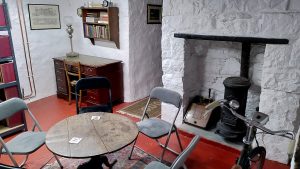
own collection, which comprises around 3,000 titles, though I’ve never got round to counting them…In due course a charitable trust will be formed and the collection bequeathed to it. It will also be open to other donations.
My own railway collection is now at Station House and there is sufficient shelf space to accommodate everything. There’s also room for small meetings and individual study/reading. If everything goes to plan there will be n informal preview of the library on Saturday October 21st, from 13.00h but ‘open house’ for the afternoon, with light refreshments available. It’s dependent on trains running so check in advance please. But all Salvo readers welcome (and donations very much welcome!). The Beach Hut Gallery, next door, has plenty of good stuff on view, and is open Thursday to Sunday 11.00 to 16.00h, so will be open on the 21st.
Plans for a monthly meeting with a guest speaker are also coming along but no date for the first session fixed as yet. If you want to be on a dedicated mailing list for the library and ‘railway book club’ events/talks, let me know.
Railway Pigs, Donkeys and other Rattlers
Another follow-up from the last Salvo. I mentioned an embryonic idea to write something about local branch lines that have survived in the popular imagination – like The Pilling Pig, Delph Donkey and Burton Dick, and have their own local name. Things have moved on and those nice people at Platform 5 Publishing in Sheffield have agreed to publish an A4-format book for next summer. So I’d better get cracking. At this stage, ideas are very welcome. I’d like to get a good
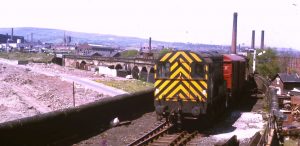
geographical coverage across Britain. The key criteria is that the particular line must have evidence of it being remembered today. It could be a photos in the local pub or village hall, a memorial plaque, or even an occasional event. It would be good to get some lines that are still open, such as The Marlow Donkey. The aim is to get about fifteen lines covered, and there’s still a few empty spaces! So please send your nominations, but remember there must be some present-day evidence that the line still has some local visibility, in whatever way (see Stuart Parkes’ letter re ‘The Marsden Rattler’ below.
Salvo Shorts
To Nottingham: Not to see the Sheriff or Robin Hood….essential railway business took me to Nottingham recently (collection of two 1908 bound volumes of Railway Magazine and return of repaired ‘Feldbahn’ loco, Lottie). I had time to wander round this fascinating city, served by frequent trams from the station. I walked up to the north end of the city centre to the Oxfam Bookshop to collect the magazines and then call in at the excellent Five Leaves Bookshop next to the City Hall. It’s one of England’s few surviving radical bookshops and is always well worth a visit. The shop has its own publishing arm

specializing in local titles. I picked up a book on Nottinghamshire writers which I’m looking forward to reading. The city centre is much changed since I last walked up from the station, through the hideous 1970s shopping centre. It’s gone! Work is in progress to rebuild the centre, be interesting to see what emerges. The city has lots of excellent pubs, cafes and independent shops. Somehow it has managed to avoid the curse of the corporate giants. The train journey was enjoyable (managing to dodge chaos in Sheffield due to a points failure). I like the Erewash Valley. One of these days I’ll get off at Langley Mill an explore DH Lawrence country, and walk over Bennerley Viaduct. If that Portillo character can do it, I can.
…and Glazebrook: Glazebrook and Irlam stations celebrated their 150th birthdays on September 2nd with some great community events. The Hamilton Davies Trust, responsible for the stunning restoration of Irlam station, organized a ‘flat cap walk’ from Irlam to Glazebrook which attracted over 50 behatted strollers. At Glazebrook itself over a hundred local people took part in events at the station and in the

nearby Methodist Hall, where entertainment included a Ukelete Band. Friends of Glazebrook Station is a relatively new adoption group but if last Saturday is anything to go by, they’ll make rapid progress. They’ve a lot to go at – the station building is mostly empty but has huge potential. Well done Julie, Alison and the Friends and all the best of luck in your endeavours.
Atlas shrugged and puffed: Bolton’s Atlas Mills were once amongst 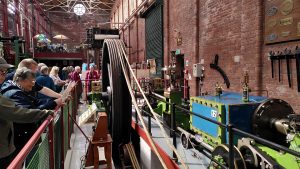 the biggest in the world. Part of the complex is now the Bolton Steam Museum – containing a great collection of working mill engines. The bank holiday weekend saw one of the occasional steaming days and attracted a good crowd. There’s always a good second-hand book stall and I came away with some nice prizes.
the biggest in the world. Part of the complex is now the Bolton Steam Museum – containing a great collection of working mill engines. The bank holiday weekend saw one of the occasional steaming days and attracted a good crowd. There’s always a good second-hand book stall and I came away with some nice prizes.
A good year for blackberries: After a generally poor summer, a positive spin-off seems to have been the exceptionally good crop of blackberries in late August and early September. I’ve got a few from my garden but the best patch by far is just off Forest Road. Maybe I shouldn’t be telling you, though most have gone now…. However, I  probably don’t need to worry, there was little sign of anyone else being out picking. I find it odd that so few people go out and collect these delicious berries nowadays. Why? Are we so obsessed with supermarket shopping that we can’t make the most of what’s there – and free! It’s also a very therapeutic activity. So get out there and start picking! They can be very nice just as they are though I have to confess I usually boil them up with a bit of sugar and use as a compȏte on my cereal. Yummy.
probably don’t need to worry, there was little sign of anyone else being out picking. I find it odd that so few people go out and collect these delicious berries nowadays. Why? Are we so obsessed with supermarket shopping that we can’t make the most of what’s there – and free! It’s also a very therapeutic activity. So get out there and start picking! They can be very nice just as they are though I have to confess I usually boil them up with a bit of sugar and use as a compȏte on my cereal. Yummy.
Railway Benefit Fund: I was recently invited to give a talk to the Railway Benefit Fund in Crewe, where the national charity is based. The Fund offers help to railway people who may be going through hard times but is also looking to develop new activities aimed at retired railway people. I came along with a couple of mates to talk about the Settle-Carlisle Line and my years working over the line as a goods guard. It happened to be Jo Kaye’s first day as CEO of the organization and she very kindly popped down to the Health Shield offices to say hello. Many will remember Jo from her time at Network Rail. A great railwaywoman who will be a huge asset to the organization. Thanks for calling in and here’s wishing you every success in the new role. See www.railwaybenefitfund.org.uk
Lancastrians: Mills, Mines and Minarets – a new history
It’s now available, published by the highly-respected publishers Hurst whose catalogue is well worth a look at it. See https://www.hurstpublishers.com/catalogues/spring-summer-2023/.
The publisher’s blurb says says: “This long-overdue popular history explores the cultural heritage and identity of Lancashire. Paul Salveson traces to the thirteenth century the origins of a distinct county stretching from the Mersey to the Lake District—‘Lancashire North of the Sands’. From a relatively backward place in terms of industry and learning, Lancashire would become the powerhouse of the Industrial Revolution: the creation of a self-confident bourgeoisie drove economic growth, and industrialists had a strong commitment to the arts, endowing galleries and museums and producing a diverse culture encompassing science, technology, music and literature. Lancashire developed a distinct business culture, its shrine being the Manchester Cotton Exchange, but this was also the birthplace of the world co-operative movement, and the heart of campaigns for democracy including Chartism and women’s suffrage. Lancashire has generally welcomed incomers, who have long helped to inform its distinctive identity: fourteenth-century Flemish weavers; nineteenth-century Irish immigrants and Jewish refugees; and, more recently, New Lancastrians from Asia, Africa and Eastern Europe. The book explores what has become of Lancastrian culture, following modern upheavals and Lancashire’s fragmentation compared with its old rival Yorkshire. What is the future for the 6 million people of this rich historic region?”
The book has chapters covering culture, politics, sport, leisure, industry, religion as well as a ‘Cook’s Tour’ of the county (mostly by train). It explores the Lancastrians who left for new lives in America, Canada, Russia and South Africa, as well as the ‘New Lancastrians’ who have settled in the county since the 14th century. There are about forty ‘potted biographies’ of men and women who have made important (but often neglected) contributions to Lancashire.
The book is hardback, price £25. Salvo readers can get a 25% discount by going to the publisher’s website (www.hurstpublishers.com) and enter the code LANCASTRIANS25 at checkout.
Readers’ Write…
A good crop of readers’ letters – many thanks, keep them coming….
Walter Rothschild offers some fascinating insights: To named trains – a classic one is ‘Bulliver’ used for the branch train Totnes to Ashburton. many years ago I used to belong to the Dart Valley Railway and read their newsletter, also called ‘Bulliver’. Nobody knew the origin of the name. Then years after that I was reading an ancient 1890’s or so issue of the Palestine Exploration Fund Quarterly at a library in Jerusalem and came across an article about Phoenician remains in Devon and Cornwall (some place names are well known in this connection, e.g. Marazion) and lo and behold there was an item on ancient Phoenician temples and altars found on the top of a hill near Totnes to ‘The God of Fire: Baal Iver’. Which means some folk memory of this name for something fiery and smoking must have survived somehow for two thousand years or so……
Three things from John Nicholson…..Ticket offices – we keep hearing that ticket office staff will be ‘redeployed’ (not heard that word for a bit – reminds me of the alleged benefits of the 1966 Selective Employment Tax) to interact with passengers on the concourse and platforms. But just how will they advertise themselves, especially on huge stations? We know where ticket office staff actually are but how easy will it be to spot them in their new ‘I’m here to help’ role where they could be anywhere? Actually I very much doubt that the new role will materialise. Secondly: Labour – I’m pretty much on the right of the party, which I joined when I started work in 1971, but am anticipating expulsion given my admission of voting Lib Dem in the 2019 local elections. If it can happen to Alastair Campbell, no one is safe!! We MUST vote TACTICALLY to get rid of the party that gave us the lies & scandals of Johnson, the chaos of Truss & the cynicism of Sunak. It’s ironic that Sunak is appearing as the motorists’ friend when his own default mode of transport is helicopter or private jet. I just hope the people who benefit from low traffic networks, 20 mph zones, ULEZ etc will remember when they cast their votes next year – provided they have the necessary ID of course.
Malcolm Bulpitt adds: Railway Names. Is/was there a local line in the country that did not have its own special name, either for the line or a local train/engine/working? The Canterbury and Whitstable Railway here in Kent was known as the ‘Crab and Winkle’ from its Day 1 in 1830, partly as it brought fresh seafood into the City. In Suffolk the short-lived Mid-Suffolk Light Railway was always ‘The Middy’, as its small preservation operation still is. Most names were friendly, but some reflected the operation’s shortcomings. In Norfolk the Midland and Great Northern Joint Railway earned the soubriquet ‘Muddle and Get (K)Nowhere’ due to its erratic service. (always liked the MSJ&A – Manchester South Junction and Altrincham Rly – or ‘Many Short Jerks – and Away!’ -ed.)
Martin Arthur sends a helpful correction: I think predictive text gave the wrong name for the 15 in gauge line near Coleford – it should be Perrygrove not Perrivale ()done! – ed.) I made a visit to the Forest in October 1967 , unfortunately just after closure of the GWR branch to Coleford in July of that year, but the ex Severn and Wye line to Parkend was still open with tracks in place to Coleford.
A fascinating place indeed with remnants of early tramroads and industries as well as coal mining.
Malcolm Bulpitt also offers some ideas from the Swiss: Booking Offices. Like you I have been saying for a long time that the obvious route for them is to be transformed/incorporated into retail outlets on their respective stations. This has been the case on the SBB/CFF in Switzerland for decades and this type of operation is also common with other operators across Europe. This would both preserve a service to the travelling public and, in the majority of cases, let the current railway staff keep their jobs. The sticking point from Mick Lynch and his hardliners point of view is that they would no longer probably feel the need to be part of ‘his’ Union and hence his salary base. It is this overtly personal agenda of the RMT top brass that is causing the disruption by unnecessary strike action over the long-overdue reorganisations that are needed in the area of railway operations.
Allen Dare writes: Re ticket office closures, it’s good you’re majoring on the potential revenue loss (even at my small local station the ticket office takings must be several hundred thousand pounds p.a.). The idea that complex enquires and transactions can be handled on a noisy, rainswept platform just as well as in a quiet, dry ticket office is ludicrous. No sensible business would risk over £1bn p.a. nationally, but this idea has DafT’s fingerprints all over it. As to train names. WCML commuters of a certain age will recall the “Master Cobbler” from/to Northampton, and “The Sandman” which also called at Leighton Buzzard. The typical formation was an 86 + 12 Mk1s, and the ECS for the evening trains was backed down Camden Bank into Euston – quite a sight.
John Davies says: I’m so pleased to be living in Wales where our much-maligned Transport for Wales concluded wage agreements with the unions over a year ago and will have nothing to do with the ‘stations idiocy’ – yet nothing is heard about this outside Wales. I understand TfW have been developing a ‘PayPoint’ solution to smaller ticket offices as general retail outlets and even bringing back ticket facilities to places that lost them years ago. It’s such a shame that rolling stock issues and staff training is impacting on services (and rail’s reputation).
Stuart Parkes nominated: ‘The Marsden Rattler’, which now gives its name to a restaurant, served surprisingly enough, the Marsden area of South Shields. A fiend of mine gave the afternoon parcels train from Leeds to Heysham which was usually very short the esoteric name ‘The Futile Flyer’. If we can go beyond Britain two of the east German narrow gauge lines have nicknames. The Puttbus- Göhren line on the island of Rügen is ‘Der Rasende Roland’ (raging Roland) and on the mainland the Bad Doberan- Kühlungsborn line is ‘Molli’ for some reason.
Book Talks
I’ve done several talks about my new book ‘Lancastrians’, including events in Bolton, Blackrod, Preston, Stretford and Grange-over-Sands.
Future events include Lancaster on September 9th, for Friends of Real Lancashire, followed by Eccles Local History Society on the 13th, Working Class Museum Library on the 15th, Turton Local History Society on the 28th, Bolton Family History Society on October 4th and Grange-over-Sands Photographic Society on the 16th. Last one currently scheduled is in Rochdale for TheEdwin Waugh Dialect Society on November 14th
Still in Print (at special prices)
ALLEN CLARKE: Lancashire’s Romantic Radical £6.99 (normally £18.99)
Moorlands, Memories and Reflections £15.00 (£21.00)
The Works (novel set in Horwich Loco Works) £6 (£12.99)
With Walt Whitman in Bolton £6 (9.99)
Last Train from Blackstock Junction (published by Platform 5 Books). A collection of short stories about railway life in the North of England. Salvo readers can get the book at a specially discounted price, courtesy of Platform 5 Publishing. Go to https://www.platform5.com/Catalogue/New-Titles. Enter LAST22 in the promotional code box at the basket and this will reduce the unit price from £12.95 to £10.95.
The Settle-Carlisle Railway (published by Crowood £24) – can do it for Salvo readers at £16
See www.lancashireloominary.co.uk for full details of the books (ignore the prices shown and use the above – add total of £3 per order for post and packing in UK)
